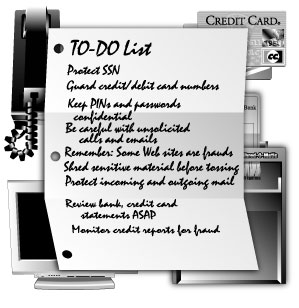A guide to help you defend against an array of scams involving checks, credit cards, ATMs, the Internet and other bank products and services
You probably think an educated consumer is someone who comparison shops and makes smart buying decisions. But there's more to being a savvy consumer than knowing how to find a good deal—you also need to know how to avoid a bad deal, especially a fraud.
FDIC Consumer News frequently publishes articles about financial scams that could affect our readers. A primary example is identity theft—far and above the top consumer fraud complaint reported to federal authorities—in which a con artist "steals" a name, Social Security number and other personal information to run up thousands of dollars in fraudulent loans or credit-card purchases.
Given the hundreds of millions of dollars that businesses and consumers lose to swindlers each year, we are devoting this edition of our newsletter to helping you defend against an array of deceptions involving checks, credit cards, ATMs, the Internet and other bank products and services. Our goal is to enlighten, not frighten, you. We hope you'll never be the victim or even the target of financial fraud. However, to boost the odds in your favor, you should learn how to protect yourself.
We also want you to understand why you should take fraud prevention seriously. It's true that federal and state laws and industry practices limit dollar losses for crime victims in many cases. It's also true that businesses and law enforcement agencies devote tremendous resources to spotting or stopping financial fraud. And many government agencies, including the FDIC, require security procedures in the private sector to help protect customers and their personal information. Even so:
- Not all crimes can be prevented, and some fraud
victims (especially those not paying attention to their bank or credit card statements and not quickly reporting suspicious activity) will lose money;
- Fraud victims may spend a considerable amount of time (sometimes years) filling out police reports, closing old accounts, straightening out their credit records or otherwise clearing their names; and
- All consumers indirectly pay some of the cost of financial fraud in terms of higher prices for goods and services (from businesses that bear the primary responsibility for losses) and higher taxes (to pay for law enforcement).
Also remember that even if you successfully sidestepped a swindle, by taking the time to report a suspicious phone call, e-mail or other transaction you can alert the proper authorities and help keep other people from becoming victims.
Our special report features an overview of financial frauds we want consumers to know about and suggestions for how to shield yourself from most major swindles. We also have provided a review of key consumer protection laws and organizations you can contact for help or more information.
Successful con artists stay one step ahead of their victims. That's why if you are aware of the games crooks play—if you recognize the warning signs and take the proper precautions—you can protect yourself and your community from the high costs of fraud.
 Fighting Financial Fraud: How to Shield Yourself from Swindles
Fighting Financial Fraud: How to Shield Yourself from Swindles